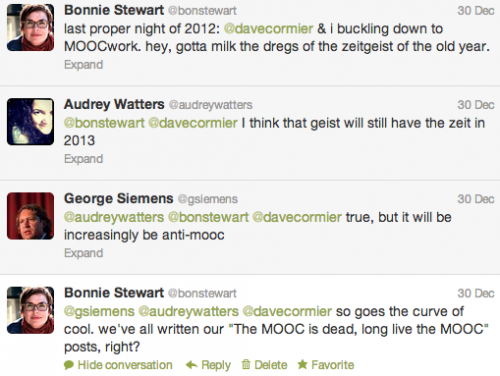Do MOOCs inherently help develop digital literacies?
I’ve been thinking about this…and I think they can – even in xMOOC format – IF they are built on platforms that enable peer-to-peer networking.
I sat down to do an experiment for this week’s #moocmooc – a kind of short video essay exploring some of my thoughts on MOOCs and their capacity for developing digital literacies in the form of decentering (gasp!) teachers – and 28 hours later, after life and meetings and childrearing and my own occasionally stunning levels of technical idiocy interfered and I decided to conflate Tuesday’s video assignment with Wednesday’s peer pedagogies assignment, kinda, I emerged with a $*&($#&%$*)! video essay that is nearly 28 hours long.
Okay, 11+ minutes.
Apparently I *don’t* think better out loud. I *do* think better in the round, though, so I’m going to try another experiment right here, and rather than expanding in my usual prosaic format about my ideas, I’m gonna try to condense them. And then open them up for critique and improvement.
You can follow along while watching the video (alas, this version doesn’t feature my cat Clementine, as two cutting-room floor drafts did, but does feature sound, which another sleek 9 minute run-through did not. Please to enjoy the fruits of my, uh, compromise. Ignore the fact that my head bobs around a whole lot. This was Take #23 or something.)
Key Ideas & Assumptions:
1. The early MOOCs DID develop digital literacies, inherently.
I always thought of MOOCs as helping to develop digital literacies because my first MOOCs were all connectivist, and focused on the generative knowledge of networks, and the principles of aggregation, remix, repurpose and feed-forward: in them, learners worked to expand on and connect with the ideas of others by creating and sharing ideas of our own.
2. Then xMOOCs came along.
The big xMOOC startups seem to have been taken up as if the transformational thing about them is that they’re massive But really, massively-scaled education was tried back in the 20th century with TV broadcast models and never really lived up to the hype (side-note: a lot of educational TV initiatives evolved into what became known as “distance learning,” which I worked in back in 1998 when it was morphing to online ed). Broadcast education at scale has never been particularly effective. Or revolutionary. And the capacity to educate at scale is not inherently digital.
3. Ergo, if MOOCs are simply massive (& open in the sense of registration), that is NOT scaling education for the digital age.
That is, in fact, what Cathy Davidson calls scaling what’s broken in education. Taking a transmission model of teaching and broadcasting it via the internet does not create digital literacies, or citizens of the Internet.
4. But if MOOCs are built on platforms that enable (and preferably coax or encourage) the digital affordance of networked participation, connecting peer to peer, they *will* teach at least one key digital literacy. Especially if they’re big.
Traditional models of education have the teacher at the centre, providing knowledge, structure, care and validation (hopefully), among other things. Learning and value can come from this, but the model has become hegemonic and leads people to approach learning situations as if they are vessels to be filled, rather than active, central participants in their own learning. But at scale, with 20,000 students, teachers can’t humanly fulfill the validation needs, in particular, of learners to know whether they’re learning and making sense. The more students, the harder that is. So what networked MOOCs at scale do is decenter teachers. Not devalue. Just decenter.
5. Unlike broadcast models of scale, networked platforms need not leave learners hanging for validation, though. Peers can and will step into collaborative validation and knowledge-building roles if they have the means to connect and share.
At first, being in any course where you’re not performing directly – and predominantly – for the teacher is disorienting. Gradually, however, so long as the facilitator still provides structure and serves to lead continued movement and step in where thorny spots or challenges become evident, this freedom to lead and explore within peer networks can be pretty heady. The extent to which a facilitator encourages this depends on the content and assessment structure of the course; if it’s a mastery-based course with testing at the end, peer-generated knowledge may not be a goal. But peer networks of shared idea validation, like free-form networked study groups, have a place in almost any learning model. Even xMOOCs.
6. So if the network capacity is present, even conventional delivery of content – whether xMOOC or cMOOC or anywhere on the spectrum in between – can implicitly help learners to learn to look to networks rather than lone teachers or facilitators.
And this IS a key digital orientation towards the world and the practice of learning.
So maybe, with millions of registrants around the world, MOOCs *can* be a key part of education for the digital age, by help learners unlearn the passive “schooling” model of transmission education that many still seem to struggle to shed. But ONLY if they utilize networked platforms that enable and encourage communications and connections between learners.
That’s my two cents. There’s something hopeful here, I think.
What do you think #MOOCMOOC? This is – even at Take #23 – just a draft of a thesis. Have at it. :)
